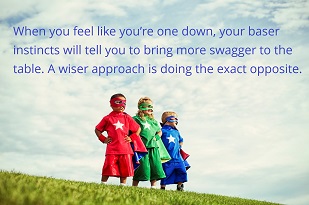This post is part of our Weekly Tips series.

Adam Grant shares a compelling story in his book Originals: How Nonconformists Move the World, from which every single person who has ever attempted to be influential can learn. The big lesson within it flies in the face of just about every piece of wisdom out there on how to be compelling and build others’ confidence in you—which is, of course, why I love it so much.
Grant tells the story of two entrepreneurs who raised millions of dollars for their company by leading with being remarkably candid about said company’s shortcomings.
Rufus Griscom and Alisa Volkman started an unconventional online parenting magazine and blog network after having their first child, and soon after sought funding from venture capitalists. They led with a slide in the pitch deck that listed the top five reasons not to invest in their business. They raised $3.3 million US in funding that year.
Two years later, they were looking for buyers, and once again led with a similar slide: the top five reasons not to buy their company. Both times the slides were no joke; they candidly surfaced the issues the company was dealing with, like user engagement and back end website issues. They sold the company to Disney for $40m US.
[Tweet “Why it pays to lead with your weaknesses #getreal #buildtrust”]
Grant suggests that the positive results of this unconventional approach can be explained by grasping the Sarick Effect, so named after social psychologist Leslie Sarick. In a nutshell, when you’re speaking to a skeptical audience, what most of us have been taught to do—aiming to win their hearts and minds with confidence—actually backfires. Why? Because skeptics naturally have their guards up, and meeting their reserve with your optimism has the natural effect of raising their shields. Leading with weaknesses, on the other hand, has at least two curious results: (1) it’s disarming, and (2) it creates allies by giving the doubting Thomas’s a problem to solve.
When you feel like you’re one down, your baser instincts will tell you to bring more swagger to the table. A wiser approach is doing the exact opposite.
It’s like that with trust. A lot.
Make It Real
This week, pay attention to your audiences’ receptivity to your ideas. If you expect or sense skepticism, try bringing your weaknesses to the fore. What do you discover?
Learn More

Read more about how to balance confidence and humility, or brush up on credibility-builders in Chapter 4 of The Trusted Advisor Fieldbook.
Andrea Howe
Latest posts by Andrea Howe (see all)
- A lesson from my own trust “fail” in my first-ever client meeting - April 15, 2024
- Why choosing silence in the face of awkwardness can be a trust tragedy - March 21, 2024
- What NOT to do when you think you’re being ghosted - February 21, 2024
